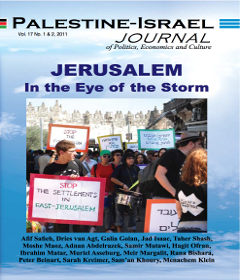Jerusalem, which has been the focus of both religious and national longings and of conflict for so many years, holds the key to the possibility of a political resolution to the Israeli-Palestinian conflict and to the future of Israeli-Arab and Israeli-Muslim relations.
Israeli leaders are being confronted by a new political reality that challenges the belief that Israel can retain its hold over the whole city forever. The international community, including the United States and the European Union, are sending clear signals that Israel's unilateral moves in East Jerusalem create obstacles to progress towards peace and must be halted.
The recent decisions by the Israeli Interior Ministry to allow the construction of hundreds of housing units in the Jewish neighborhoods in occupied East Jerusalem, together with the continued Israeli policy of demolishing Arab houses, including the Jerusalem municipality's decision to destroy 22 Palestinian homes in Silwan for the building of a "biblical park for the sake of both Israelis and Palestinians," threaten to deepen the crisis. Over 50 Arab houses have been demolished since the beginning of 2010, while restrictions on granting building licenses to Arabs are getting stiffer all the time.
Perhaps contrary to Israeli Prime Minister Binyamin Netanyahu's wishes, Jerusalem has been thrust to the forefront of any renewed peace negotiations.
The vast majority of Palestinians living in East Jerusalem were born under Israeli occupation, yet they identify themselves as Palestinian, and tie their future to that of the Occupied Palestinian Territories in the West Bank and the Gaza Strip. Since 1967, Israel has demarcated the Palestinians' future and tried to shape it. Reinforced by the construction of Israel's separation wall, this demarcation has left significant marks on their daily lives, maintaining and perpetuating the inequalities between them and their Jewish neighbors, and severing practically all their relations - personal, social, political, economic and cultural - with the Palestinians in the occupied West Bank on the other side of the wall.
Blessed, but also cursed, by its holiness, Jerusalem could yet once more derail current efforts to revive a peace process conducive to a political settlement. Therefore, it is particularly important to delve into the situation on the ground and to understand the trends that are developing and the policies behind them. Facts depend not only on who defines them, but also on who creates them.
In the eye of the gathering storm, this Palestine-Israel Journal issue has been conceived as an eye-opener to the human condition - political, social, economic and cultural - of the Palestinians trapped under occupation in East Jerusalem and of the Israelis trapped in their exclusive hold on the city. It is an intimate and personal encounter with the dreams that move both peoples, with the obstacles and prospects with which they grapple in their daily lives and with the possible solutions for the future of this historical and troubled city.
This special double issue of the Palestine-Israel Journal devoted to Jerusalem, past, present and future - to be followed by a public international conference in Jerusalem - is an attempt to enhance and promote public debate locally and internationally on the issue of Jerusalem, inspired by the belief that without breaking the taboos, without thinking out of the box and without emphasizing the fact that Jerusalem is the key to peace or war, we could all miss the historic opportunity to make peace.

